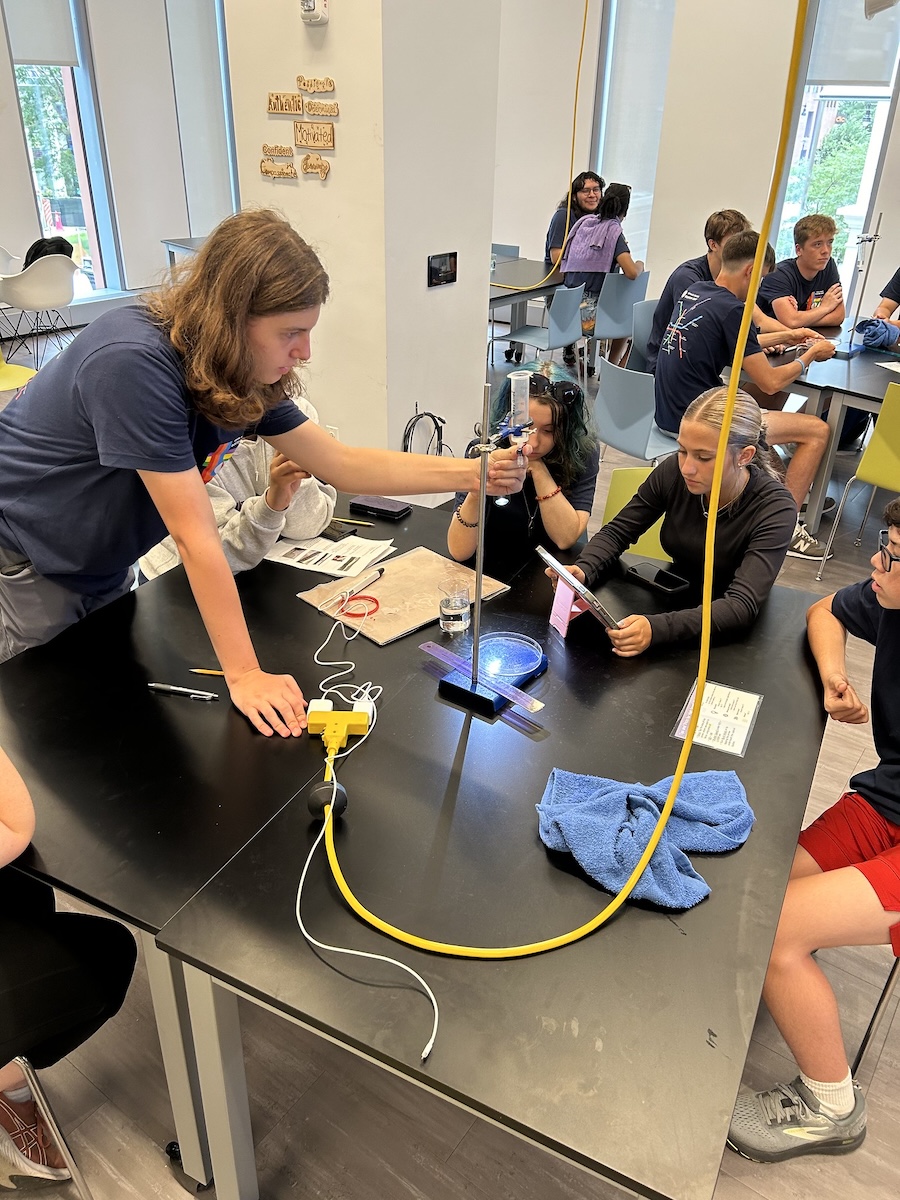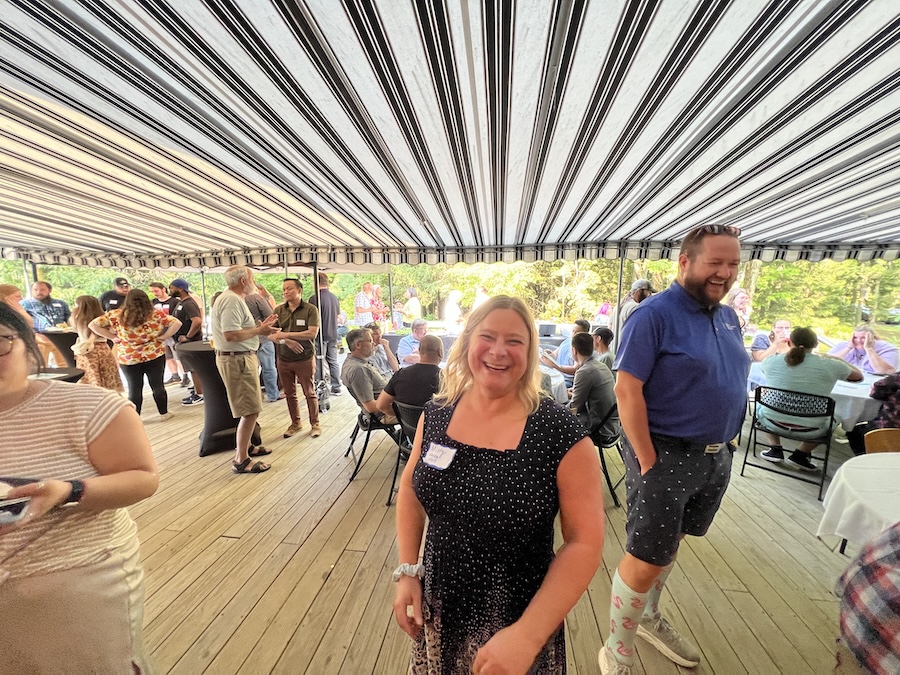Onward and Upward: A College-Access Progam Celebrates Sixty Years
By Rebecca GoldfineThe Upward Bound program at Bowdoin recently celebrated its anniversary on campus, looking back at the six decades it has helped limited-income and first-generation high schoolers from Maine achieve a college education.
While the August 2 party at Cram Alumni Barn was festive—with Upward Bound alumni from the 1980s through the 2000s enjoying lots to eat and drink under the deck's striped awning—it took place during unprecedented political upheaval in Washington, DC, that is threatening long-established social and educational programs.
A couple of alumni said one reason they attended the party was to speak up publicly about how much the program meant to them. “It matters to say how impactful this was on my life,” Rachael Schofield Grady '90 said.
When Grady participated in Upward Bound’s academic summer programs at Bowdoin in 1985 and 1986, she was a teenager growing up in Perry, a small town in Washington County, one of Maine's poorest.
 Upward Bound at Bowdoin is part of a nationwide, federally funded program that is free for qualified high school students who are the first in their family to go to college or come from a limited-income background, or both. The program offers year-round support, including a residential summer experience on Bowdoin's campus.
Upward Bound at Bowdoin is part of a nationwide, federally funded program that is free for qualified high school students who are the first in their family to go to college or come from a limited-income background, or both. The program offers year-round support, including a residential summer experience on Bowdoin's campus.
Grady went on to matriculate at Bowdoin, graduating in 1990, before earning her master’s degree and becoming a social studies high school teacher in Gorham, Maine. With neither parent having pursued higher education, Grady said she didn’t know how to “access college.” Upward Bound opened that door for her.
Her partner, Don Jordan, also attended the party with her. (The two met at Upward Bound in the mid-eighties). Like Grady, Jordan grew up in Downeast Maine with parents who made ends meet by taking hourly, seasonal jobs common to that part of the state, like clam digging, wreath making, and house cleaning.
“Upward Bound creates a ripple effect that breaks generational poverty. One kid goes to college, and then their kids go to college. It changes the game for entire families.”
—Jen Rudolf, Council for Educational Opportunity's associate vice-president for pre-college and state initiatives
“Upward Bound removed a lot of barriers,” Jordan said, making it possible for him to study mechanical engineering at Rensselaer Polytechnic Institute and earn a PhD in aerospace engineering at University of Texas at Austin. Jordan taught and ran a research lab at University of Virginia for twenty years before starting his own engineering consulting firm, Dojo Research.
“We want to elevate TRIO,” Jordan said, referring to the federal programs, including Upward Bound, that were launched in 1965 as part of President Lyndon Johnson’s war on poverty.




“Grassroots stories”
It is stories like these—from Upward Bound alumni who have had careers beyond their childhood expectations—that do the most to convince policymakers to keep funding Upward Bound year after year, said Jen Rudolf, who works for Upward Bound's national office and was in Maine for the anniversary party.
“Upward Bound creates a ripple effect that breaks generational poverty,” she said. “One kid goes to college, and then their kids go to college. It changes the game for entire families.”
Ginny Ward, director of Upward Bound at Bowdoin, noted in her speech to party guests that Upward Bound's “foundational premise—that access to educational opportunity combined with the support and resources for completing a degree would raise students out of poverty and improve their economic opportunities—remains as critical today as it was sixty years ago.”
“Upward Bound's foundational premise, that access to educational opportunity...would raise students out of poverty and improve their economic opportunities, remains as critical today as it was sixty years ago.”
—Ginny Ward, Bowdoin Upward Bound director
At the party, Ward invited attendees to share their own Upward Bound stories. Several spoke emotionally about rising above trauma and poverty.
“This place saved my life,” a man who introduced himself as Keith said. When he was accepted into the program as a teenager, he was reeling from his mother’s death and living in foster care. “I learned a lot and it constantly saved my life. I was supposed to be dead when I was twenty.” Today he runs a transfer station and owns a home, an outcome he said he marvels at every day.
Kevin Thompson, who attended Upward Bound in 1995 and 1996, described his Upward Bound summer experience as “life-changing and eye-opening.”
“I grew up in a home with economic challenges, which limits what you think is possible,” he said. Had he not attended Upward Bound, Thompson believes he’d still be living in Machias, working locally to support his family. Instead, he earned his degree in business from University of Southern Maine and has worked as a relationships manager for twenty years at WEX, a global payment processing company based in Maine—“a great career,” he said.
Now he is encouraging his children, who are twelve and fourteen, to aim for college. “Upward Bound helped my children set their sights higher, too,” he added. “It's been exponentially beneficial.”
Slideshow: A College Fair for the College Bound, a Visit from a Senator's Aide, and a Visit to the Archives





In advance of the sixtieth anniversary party, Upward Bound's operations administrator, Keith Reinemann, scoured Bowdoin's archives for mementos. He found items like old photographs, budget documents, and collections of personal student writing, some describing similar hardships that students still face fifty and sixty years later.
Besides teaching students college-prep classes in many different subjects, taking them to visit college campuses, assisting with applications and financial aid forms, Upward Bound maintains an alumni-supported fund—the Dory Vladimiroff Upward Bound Fund—to cover unexpected costs that can derail a student's best intentions.
“While celebrating the individual student and meeting them where they are is so much of what we do, we also help them get eyeglasses, clothing, and dental and doctor's visits,” Reinemann said.